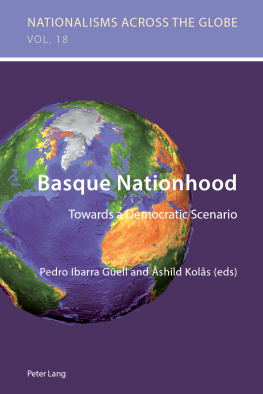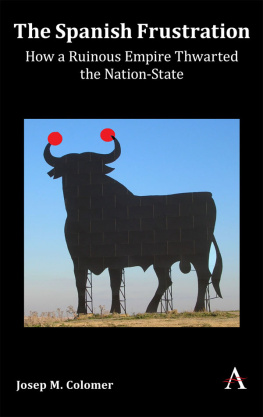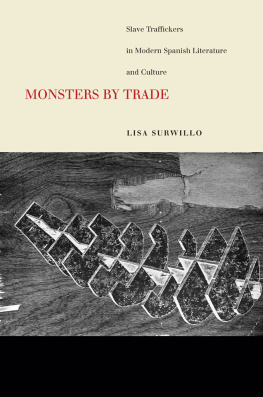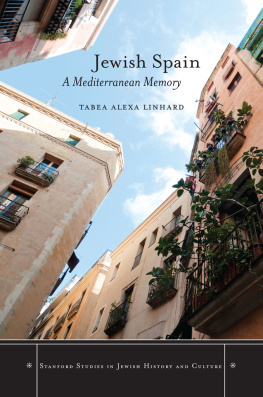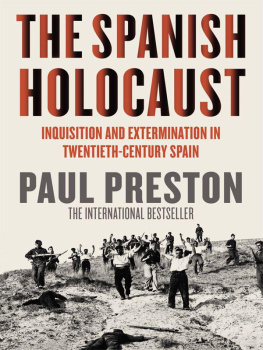The idea of a divided Spain, where one half is antagonistic to the other half, dates back at least to the 19th-century Spanish satirist Mariano Jos de Larra who, in his essay All Souls Day 1836, wrote Here lies half of Spain. It died of the other half. The narrative of las dos Espaas is evident across many political and historical debates operating in the Spanish state, and contemporarily it shadows and informs national issues from Catalan independence to the teaching of history in schools. But it is most polemical in debates concerning the issue of terror in all its manifestations. Las dos Espaas takes a multidisciplinary approach in understanding narratives of terror in contemporary Spain, in an attempt to contextualize terrorism socially and politically, as well as ideologically. Selective case studies of terror related events in the Spanish state will include the long-running Basque conflict, the state-sponsored death squad (GAL) scandal in the 1980s, the March 2004 terrorist attacks in Madrid, and other terror episodes. The author argues that these terror-related events can be re-read in terms of traces and links to long-standing historical narratives. However, since the onset of the global economic crisis in 2009, and its devastating effect on Spanish society, narratives of economic crisis have begun to supersede narratives of terror in the construction of the two Spains. The conclusion drawn is that the narrative of las dos Espaas still has the power to continue to divide Spain ideologically in political discourse. Terror and crisis narratives are intertwined with the narrative of las dos Espaas to provide a coherent argument that allows one to better understand the subversive nature of contemporary Spanish politics.
Cover illustration: Las dos Espaas (from a series of paintings called Tauromaquia), reproduced with kind permission from the artist Carlos Andino.
Dr Nicholas Manganas completed his PhD in International Studies at the University of Technology, Sydney (UTS) in 2010. After many years living and teaching in Spain he currently teaches in the International Studies In-Country Studies program at UTS. He participates in many international conferences and has published widely in multidisciplinary journals.
The Caada Blanch / Sussex Academic Studies on Contemporary Spain
General Editor: Professor Paul Preston, London School of Economics
A list of all published titles in the series is available on the Press website. More recently published works are presented below.
Peter Anderson, Friend or Foe?: Occupation, Collaboration and Selective Violence in the Spanish Civil War.
Margaret Joan Anstee, JB An Unlikely Spanish Don: The Life and Times of Professor John Brande Trend.
Richard Barker, Skeletons in the Closet, Skeletons in the Ground: Repression, Victimization and Humiliation in a Small Andalusian Town The Human Consequences of the Spanish Civil War.
Germ Bel, Infrastructure and the Political Economy of Nation Building in Spain, 17202010.
Germ Bel, Disdain, Distrust, and Dissolution: The Surge of Support for Independence in Catalonia.
Carl-Henrik Bjerstrm, Josep Renau and the Politics of Culture in Republican Spain, 19311939: Re-imagining the Nation.
Kathryn Crameri, Goodbye, Spain?: The Question of Independence for Catalonia.
Pol Dalmau, Press, Politics and National Identity in Barcelona: The Transformation of La Vanguardia, 18811939.
Mark Derby, Petals and Bullets: Dorothy Morris A New Zealand Nurse in the Spanish Civil War.
Francisco Espinosa-Maestre, Shoot the Messenger?: Spanish Democracy and the Crimes of Francoism From the Pact of Silence to the Trial of Baltasar Garzn. Mara Jess Gonzlez, Raymond Carr: The Curiosity of the Fox.
Helen Graham, The War and its Shadow: Spains Civil War in Europes Long Twentieth Century.
Angela Jackson, For us it was Heaven: The Passion, Grief and Fortitude of Patience Darton From the Spanish Civil War to Maos China.
Gabriel Jackson, Juan Negrn: Physiologist, Socialist, and Spanish Republican War Leader.
Nathan Jones, The Adoption of a Pro-US Foreign Policy by Spain and the UnitedKingdom: Jos Mara Aznar and Tony Blairs Personal Motivations and their Global Impact
Xavier Moreno Juli, The Blue Division: Spanish Blood in Russia, 19411945.
David Lethbridge, Norman Bethune in Spain: Commitment, Crisis, and Conspiracy.
Antonio Miguez Macho, The Genocidal Genealogy of Francoism: Violence, Memory and Impunity
Carles Manera, The Great Recession: A Subversive View.
Nicholas Manganas, Las dos Espaas: Terror and Crisis in Contemporary Spain. Jorge Marco, Guerrilleros and Neighbours in Arms: Identities and Cultures of Antifascist Resistance in Spain.
Martin Minchom, Spains Martyred Cities: From the Battle of Madrid to Picassos Guernica.
Olivia Muoz-Rojas, Ashes and Granite: Destruction and Reconstruction in the Spanish Civil War and Its Aftermath.
Linda Palfreeman, Spain Bleeds: The Development of Battlefield Blood Transfusion during the Civil War.
Isabelle Rohr, The Spanish Right and the Jews, 18981945: Antisemitism and Opportunism.
Gareth Stockey, Gibraltar: A Dagger in the Spine of Spain?
Maria Thomas, The Faith and the Fury: Popular Anticlerical Violence and Iconoclasm in Spain, 19311936.
Dacia Viejo-Rose, Reconstructing Spain: Cultural Heritage and Memory after Civil War.
Dedicated to Paul Allatson,
without whom this book would never have seen the light of day; and to all the victims of political violence in the history of the Spanish state. May you rest in peace.
Copyright Nicholas Manganas 2016.
Published in the Sussex Academic e-Library, 2016.
SUSSEX ACADEMIC PRESS
PO Box 139
Eastbourne BN24 9BP, UK
and simultaneously in the United States of America and Canada
All rights reserved. Except for the quotation of short passages for the purposes of criticism and review, no part of this publication may be reproduced, stored in a retrieval system or transmitted in any form or by any means, electronic, mechanical, photocopying, recording or otherwise, without the prior permission of the publisher.
British Library Cataloguing in Publication Data
A CIP catalogue record for this book is available from the British Library.
ISBN 978-1-78284-316-0 (e-pub)
ISBN 978-1-78284-317-7 (e-mobi)
ISBN 978-1-78284-318-4 (e-pdf)
This e-book text has been prepared for electronic viewing. Some features, including tables and figures, might not display as in the print version, due to electronic conversion limitations and/or copyright strictures.
Contents
The Caada Blanch Centre for Contemporary Spanish Studies
Acknowledgements
Glossary
Introduction
O NE | Narratives of Political Violence: The Narrative of |


